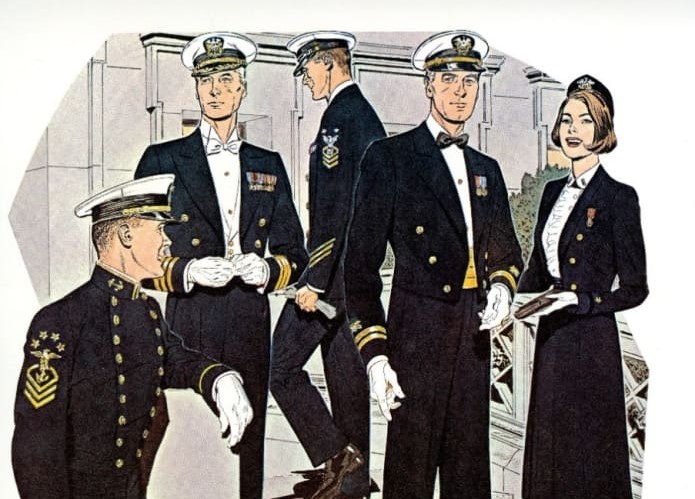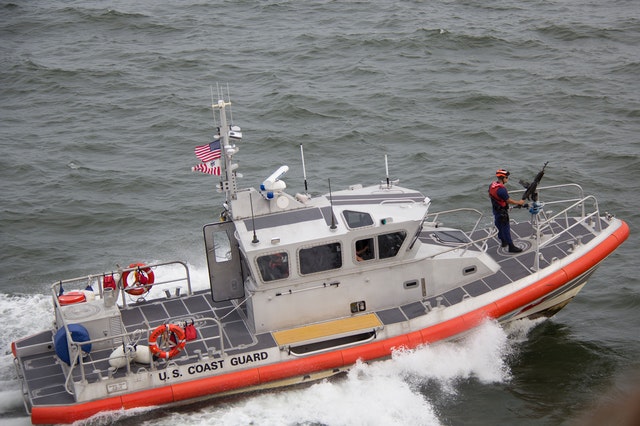The Coast Guard was established in 1915 as a branch of the United States Armed Forces. Members of the Coast Guard are in charge of enforcing federal law, protecting natural resources, and saving lives at sea. Passing a physical exam is one of the first requirements for joining the Coast Guard. We would also go over the requirements for joining the Coast Guard and provide you with a free Coast Guard ASVAB Practice Test pack.
What Is the US Coast Guard?
The Coast Guard is unique because it is not a part of the Defense Department. It is a maritime security organization. However, the Coast Guard is considered as military service. The Coast Guard is commanded by a four-star admiral, known as the Coast Guard commandant.
What does the Coast Guard do?
In times of peace, the Coast Guard operates as part of the Department of Homeland Security. Its duties include enforcing the nation’s laws at sea, protecting the marine environment, guarding the country’s vast coastline and ports, and performing vital life-saving missions.
Advantages of Joining the Coast Guard?
As an active-duty member of the Coast Guard, you’ll have access to a benefits package that is largely unheard of for most people including College tuition assistance, housing and meal allowance, free health, dental, and eye care, and more advantages offered. In addition, other allowances might include sea pay, housing allowance (if you don’t use the government housing that is provided), clothing allowance, family separation allowance, and hazardous-duty pay.
- Pay: Once joining the Coast Guard, you are paid twice every month, on the first and 15th. Income increases based on your pay grade and service requirements. All active-duty enlisted members entering the Coast Guard start out earning about $20,000 each year. This is just basic pay. Members may also be entitled to other allowances, which vary depending on their status.
- Promotion: You would get promoted based on job knowledge, your performance, time in pay grade, and service requirements.
- Paid vacation: You receive 2.5 days of paid vacation per month for a total of 30 days each year, up to 60 days.
- Training: You choose your career path based on your aptitude, physical abilities, security clearance, motivation, and determination. All specialties in the Coast Guard are open equally to men and women.
- Health care: While on active duty, you will receive complete medical, eye care, and dental care at no cost.
- Life insurance: As an active-duty member, you can select up to a maximum of $400,000 in term life insurance for a low price.
- Allowances for housing and meals: You also may receive additional tax-free money for Basic Allowance for Housing (BAH) if government housing is unavailable; Basic Allowance for Subsistence (BAS), if government food facilities are not available in the area where you are stationed; and a uniform allowance (for enlisted personnel only) to help maintain your uniform.
- Education: Provides up to 36 months of education benefits for 15 years after your release from active duty
GI Bill: The GI Bill will help you pay for college education or vocational training.
Tuition assistance: While on active duty, you can continue your education process and maybe help in defraying the cost of college-accredited courses.
- Additional benefits: There also are exchange and commissary privileges, moving allowances, temporary lodging expenses, travel, survivor benefits, Veterans Affairs home loans, and more.
Requirements to enter the Coast Guard
Joining the Coast Guard is more difficult than other branches because it accepts much fewer recruits than the other branches of the military, and enrollment requirements are tough and strict. You will even have to go through a credit check and pass a security clearance check.
The following are the basic requirements for joining. You are eligible to enter the Coast Guard Academy if:
- You’re a U.S. citizen or a resident alien.
- Be 17-27 years old. Seventeen-year-olds need parental consent.
- Hold a high school diploma.
- Have no more than two dependents.
- Take and pass the Armed Services Vocational Aptitude Battery (ASVAB) test. The minimum ASVAB score for Coast Guard recruits is 40. Minimum AFQT scores of 50 and at least 15 hours of college credit are required for those holding a high school equivalency degree (GED, TASC, HiSET).
- Pass a Military Entrance Processing Station medical exam.
- Have a willingness to serve on or around the water.
To help you get ready for your ASVAB test, we offer a free ASVAB practice test website that covers all 9 ASVAB sections. Thousands of ASVAB practice questions will let you easily pass your exam. Let’s try now!
Physical Requirements
Physical requirements for joining the Coast Guard vary depending on each Service branch. Generally, potential recruits should be in good physical condition, in qualified weight, and have the ability to pass a standard physical screening before entry.
What to Expect From the Physical Exam
A Military Entrance Processing Station (MEPS) medical section supervisor illustrates what happens when recruits are taking their physical exam at an MEPS.
Educational Requirements
Success in any branch of the Military also requires a good education proven by scores. A high school diploma is most desirable. Applicants with a GED (General Education Development) certificate can enlist, but some Services may limit their opportunities. It is very difficult to be considered a serious candidate without either a high school diploma or an accepted alternative credential.
SAT/ACT
There is no minimum SAT/ACT score requirement for joining the Coast Guard. You must obtain scores reported without the benefit of testing accommodations. Successful test-takers usually score at least 1120 combined Evidence-Based Reading/Writing and Math on the SAT or have an ACT Composite of at least 24.
Step 1: Prepare for Training
Once you join the Coast Guard, perfect preparation is the very first thing you need to do for basic training. It’s recommended to follow a nutrition plan and complete strength, and flexibility exercises to prepare for the challenging physical requirements of training. It’s also suggested that recruits who use tobacco products join a cessation program since smoking is prohibited during basic training.
Step 2: Complete Basic Training
As in all branches of the military, physical demands can be intense, and so new Coast Guard recruits are rigorously trained and tested at boot camp. The Coast Guard only has one location for enlisted basic training: Coast Guard Training Center Cape May in Cape May, New Jersey
The Requirements for joining the Coast Guard are not the same for everyone. The Coast Guard has a few different enlistment options, and each one will have its requirements. Coast Guard Boot Camp is the first step of Coast Guard training.
As mentioned above, U.S. Coast Guard recruits attend basic training for eight weeks in Cape May, NJ. Upon arriving at training, they’re given haircuts, uniforms, personal hygiene items, and medical tests before being assigned to a company. The company commander teaches recruits military drills, marching, weapons handling, and military courtesies. Recruits participate in daily physical conditioning and receive hands-on training in marksmanship, firefighting, seamanship, and water survival methods. After completing basic training, graduates are assigned to their first unit.
Interview
There may appear a request to interview candidates to best meet your needs and the Academy’s enrollment goals. If so, a representative of Admissions will contact you for more details. If you’re selected for an interview, it is required. The format of the interview may be online, by phone, or face-to-face. It will vary based on the mutual consent of all parties, with health and safety the paramount concern.
Joining the Coast Guard | FAQs
Do I have my choice of job specialties in the Coast Guard?
Coast Guard men and women serve in various locations throughout the world in Europe, Asia, the Middle East, and the Caribbean. Most jobs are located over the United States and Puerto Rico from Maine to Florida; Texas to Minnesota; and California to Hawaii.
Is there an opportunity to receive advanced training in the specialty?
The answer is Yes. You can receive advanced training with Class ‘A’ schools. After you’ve applied that training on the job, some specialties offer additional advanced training as well.
How long is active duty in the Coast Guard?
4 years is the common contract of active duty in the Coast Guard. You may want to prepare yourself before going on such a journey.
How long am I required to serve?
Enlistment contracts are for 8 years. The most common contracts include 4 years of active duty and another 4 years in the inactive reserve component. Three, four or six-year active duty contracts may be offered in some cases.
Is Coast Guard boot camp the hardest?
While it may not be as physically challenging as the Marines, it is still difficult enough. Statistics show that it has the highest failure to complete rate of any of the services at roughly 20%. When you consider that the USCG has the highest minimum standards for enrollment, maybe USCG boot camp is in fact the most difficult.
Can I serve part-time?
Yes, of course. The Coast Guard Reserve is a part-time force of specially trained people who serve the Coast Guard one weekend a month and two weeks every year. Many Reservists have other occupations or they are students who are obtaining a degree. Whatever the case is, the Reserve provides the advantages of military service without eliminating other pursuits.
What opportunities are in the Coast Guard Reserve and what are the qualifications to join?
In general, Reservists work alongside active duty men and women filling many of the same basic job functions. Some port-security job functions are exclusive to the Reserve. Reserve needs vary depending on location.
What happens if you fail Coast Guard boot camp?
Unfortunately, Recruits that fail the physical fitness test need additional training and must try once again in week seven. If you fail midterms, the Coast Guard allows you only one re-test. Those who still fail the retest must try boot camp once again from the beginning of the process.
Read more >> Joining the Navy: All Requirements You Need to Know
How long is boot camp for Coast Guard?
8 weeks
The Coast Guard’s boot camp lasts for 53 days or 8 weeks. The training is designed to help you understand the principles of the Coast Guard with the goal to build your physical endurance, add key skills and knowledge you will need in the field, and craft you into a disciplined Coast Guardsman.
What is the best job in the Coast Guard?
After joining the Coast Guard, we’ve suggested the 5 Best Coast Guard Jobs for you to consider:
- Avionics Electrical Technician.
- Boatswain’s Mate.
- Information Systems Technician.
- Rescue Swimmer.
- Direct Commission Aviator (Helicopter Pilot) Conclusion.
What is the highest paying job in the Coast Guard?
Jobs in the Coast Guard are not low-paying. The highest-paying job at the US Coast Guard, according to data, is Senior Strategic Consultant, which pays $160,000 per year. Your salary is also determined by your U.S Coast Guard Ranks and length of service.
Hope that this article helps you clearly grasp all the requirements for joining the Coast Guard!

ASVAB General Science Study Guide In 2024
April 25, 2023

A Complete Pictorial History Of US Navy Uniforms From 1776 To 1967
Follow this article to find out the pictorial history of US Navy uniforms from 1776 to 1976 and beneficial information about US Navy uniforms as well!
March 9, 2022

Can An Immigrant Join The Army In The United States? [2024 Updated]
Can an immigrant join the Army? You do not have to be a U.S. citizen to enlist in the Army but you need to meet some requirements. Read this post to know more.
March 5, 2022



